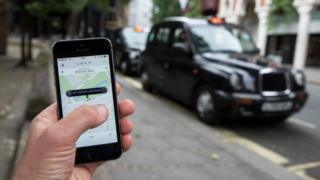Uber drivers launch legal battle over ‘favouritism’
 Image copyright Getty
Image copyright Getty Uber has been accused by a UK-based drivers union of displaying favouritism in the way in which it allocates jobs.
The App Drivers & Couriers Union has launched a legal challenge in a bid to understand how the firm’s algorithms pair drivers with ride requests.
The union wants Uber to be more transparent about how the data it collects impacts drivers, and whether it leads to favouritism.
Uber has always said that it does not manage its self-employed drivers.
However the union alleges that Uber is monitoring drivers’ performance, and claims that the firm is noting incidents of late arrivals, cancelled jobs and customer complaints about attitude or inappropriate behaviour against driver profiles.
“This is about the distribution of power,” Anton Ekker, the privacy lawyer leading the case, told the Guardian.
“It’s about Uber exerting control through data and automated decision-making, and how it is blocking access to that.”
The union argues that under GDPR regulations, Uber drivers have the right to access their profiling data.
It says such data can include evaluations of a worker’s reliability, behaviour, attitude and the number of late arrivals or cancelled trips they have had.
Two of its members, UK-based drivers Azeem Hanif and Alfie Wellcoat, allege that Uber has failed to fulfil its obligations in its response to their request.
The group is asking the district court in Amsterdam, where Uber’s headquarters are based, to order Uber to comply with data protection law.
A spokesman for Uber said the company endeavoured to fulfil requests for personal data that individuals were legally entitled to.
«We will give explanations when we cannot provide certain data, such as when it doesn’t exist or disclosing it would infringe on the rights of another person under GDPR,» he said.
«Under the law, individuals have the right to escalate their concerns by contacting Uber’s data protection officer or their national data protection authority for additional review.”
It comes as Uber prepares to attempt to overturn a UK court ruling that its drivers are workers rather than independent contractors.
The company’s appeal begins at the Supreme Court on Tuesday, where it will argue that it is not an employer.
The UK gig economy employs an estimated 4.7 million people, and the ruling is expected to have wide-ranging implications for the sector’s future.


